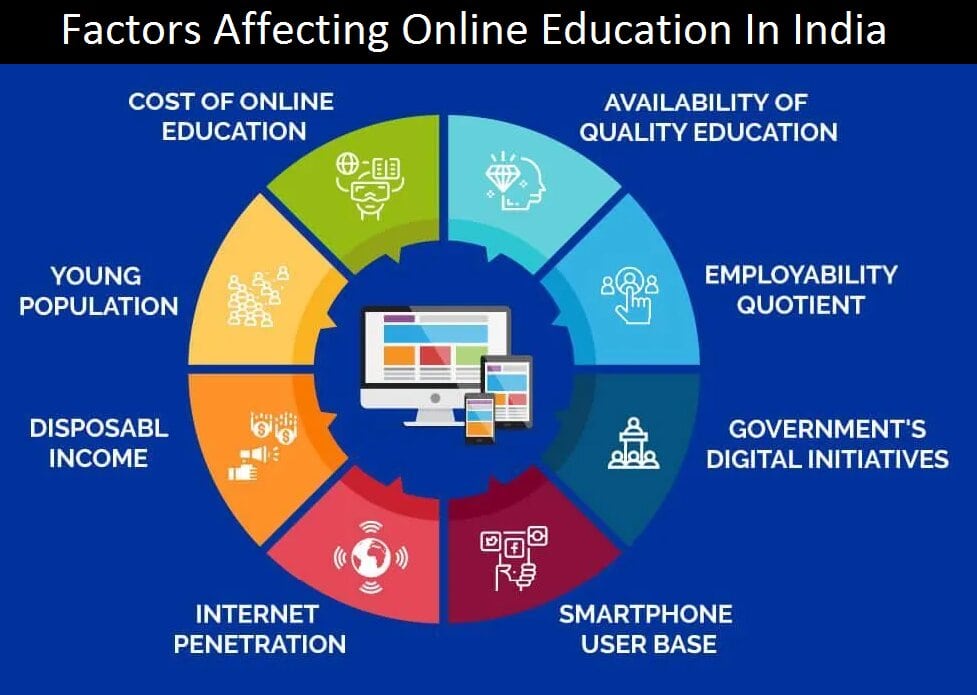Governance
Online Education
- 01 Jul 2020
- 5 min read
Why in News
Recently, the Central government has proposed long-term measures to address social inequities in online education, as highlighted by the Covid-19 pandemic.
- The measures include plans to distribute laptops or tablets to 40% of all college and university students over the next five years and to equip all government schools with Information and Communication Technology (ICT).
- Earlier in April 2020, the Centre had announced to start the 2020-21 academic year virtually.
Key Points
- Facilitation of Online Education:
- Providing Laptops and Tablets:
- Providing these devices to 4.06 crore students (40% of the projected student population) by 2026, at a total cost of Rs. 60,900 crore.
- The Centre and States will share the cost in a 60:40 ratio.
- Installing ICT Facilities:
- The Ministry of Human Resource Development proposes to spend Rs. 2,306 crore on developing and translating digital course content and resources over the next five years.
- Different e-learning techniques will be used like YouTube, Google Classroom, SWAYAM Prabha portal, direct-to-home (DTH), etc.
- Providing Laptops and Tablets:
- Sanitisation and Quarantine Measures before School Reopenings:
- The measures would include ensuring basic water, sanitation and hygiene (WASH) facilities, safe drinking water, availability of sanitiser, disinfectant, cleaning material and equipment for temperature checking.
- Financial Support:
- Under the composite grant for schools, ranging between Rs. 25,000 for small schools with less than 100 students and Rs. 1 lakh for schools with over a thousand students for awareness and community mobilisation to sensitise parents, students and local leaders about pandemics, social distancing and other preventive measures.
- Rs. 1,000 per teacher to encourage them to function as first-level counsellors, disseminate basic information about Covid-19 and provide digital/online/mobile education.
- Rs. 1 lakh per school for sanitisation and quarantine measures in preparation for the safe reopening of schools.
- A proposed budget of Rs. 55,840 crore to equip government schools above the upper primary level, with ICT facilities.
Challenges
- Social Inequity:
- e-Learning is a privilege for the students from middle and upper class but it has proved to be a nuisance for students from the lower middle class and people living below the poverty line (BPL).
- Marketing of Education:
- Corporate houses, technology firms and educational institutions will be working closely to achieve the goals of e-learning which may aggravate the commercialisation of education and exclude the self-dependent tutors and students from economically weak backgrounds.
- Technological Constraints:
- Poor students, who do not have access to e-resources (computers, laptops, internet connectivity), will not be able to attend classes from home.
- Teachers too might have technical constraints and if teachers are equipped but the same might not be the case for the institutions.
- Lack of Practical Learning:
- Most of the subjects like beauty culture, fashion design and tailoring, office management, travel and tourism, web design etc need practical learning so it is difficult to teach them from a distance.
- Traditional classroom organisations like schools and colleges, as social space (whereby a student not just learns the academic knowledge but many social skills also), are indispensable.
Way Forward
- The government should start making access to technology universal in the public education system. Private players can make e-resources accessible and available to students under the Corporate Social Responsibility (CSR).
- The definition of the right to education needs to expand and promote online education so that it addresses the importance of connectivity and access to knowledge and information.
- Traditional classroom organisations should give way to online education.
- Further, there is a need for deep reflection on curriculum and to ensure scientific literacy within it as the society still struggles against superstitions and hardly fights misinformation actively.







